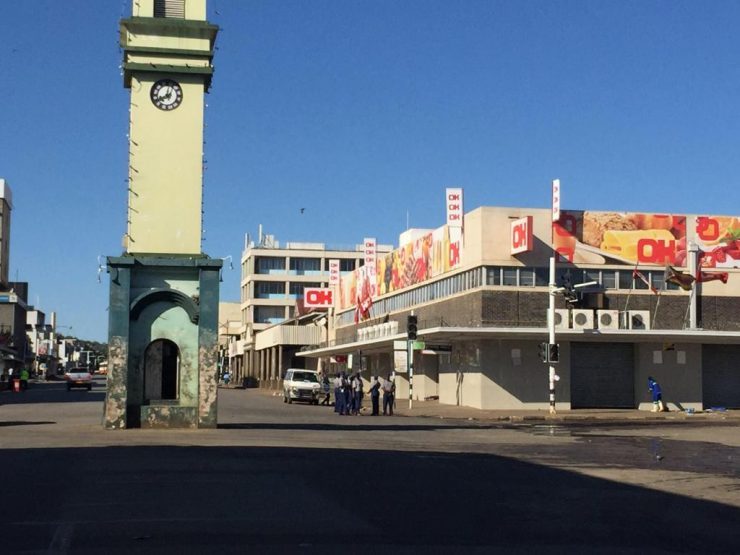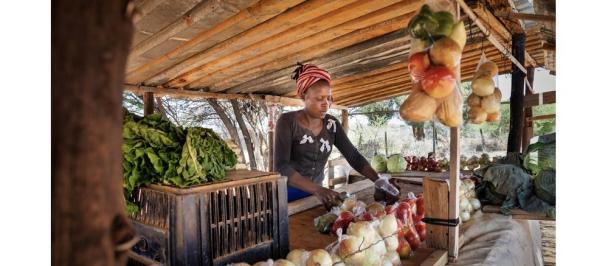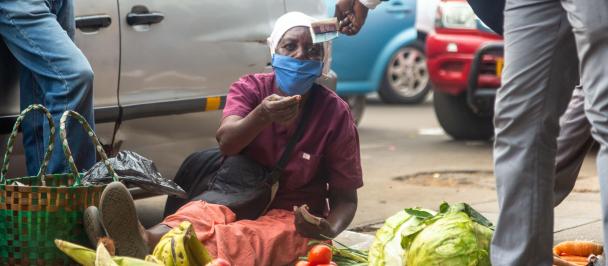WRITTEN BY: Accelerator Lab Zimbabwe AUTHORS: Shamiso Ruzvidzo, Sharleen Moyo and Gift Ntuli
Rural-Urban Supply Chain Platform during Covid-19
April 28, 2020
Figure 1: Deserted Gweru City on the first day of lockdown - Image courtesy of New Zimbabwe
On the morning of the 30th March 2020, Zimbabwean cities woke up like ghost towns, due to the Government of Zimbabwe’s decision to place the nation on a 21-day lockdown, as a means of preventing the spread of COVID-19. The decision led to Zimbabweans retreating to their homes and cities being virtually empty, surprisingly to some even informal vendor markets complied. Like many cities around the world, all measures to slow the spread of the coronavirus from national quarantines to school closures, have been taken.
Figure 2: Harare City on the first day of lockdown - Image courtesy of 263 Chat
Figure 3: Informal market space first day of lockdown - Image courtesy of 263 Chat
The biggest question being asked globally is whether a lockdown and social distancing measures will work in Africa, given the characteristics of many African cities. For example, it is estimated that about 2/3rds of Nairobi’s population lives on just 6% of its land. In Kampala, 71% of households sleep in a single room, and in Zimbabwe the informal sector contributes significantly to the development of the Zimbabwean economy (estimated over 60% of GDP and 85% of jobs). Understandably vendors need to take to the streets for their livelihood, farmers need to make sure their product moves on a daily basis and Zimbabwean citizens rely on both these supply groups for goods as a more affordable alternative. As a result, it took a mere 24 hours for Zimbabweans to get back the streets to move products (tomatoes, potatoes etc) and to sell, through markets and vending spots which posed an urgent question on health and safety. The question many were asking was how sustainable it would be for the supply chain to completely locked down, especially as people require uninterrupted food supply during the lockdown period. The President of Zimbabwe went on to announce that all farmers and traders must continue to deliver produce to food markets, including those markets that supply our cities, towns, and growth points. This would help preserve jobs, livelihoods, and access to food especially during the lockdown.
Although a welcome announcement, one of the biggest challenges is ensuring that all movements of food from farmers to distribution hubs, food markets and ultimately consumers whilst abiding by health and safety regulations. Something many cities around Africa and Asia in particular are struggling to navigate,
Figure 4: Mbudzi Market, Harare Zimbabwe – Image courtesy of Steven Chikosi
It's with this in mind that the Country Office, with the Accelerator Lab leading, is developing an approach to establish a safe and resilient agricultural supply chain, facilitating information flow that ensures the continuation of movement and supply of goods, from smallholder producers in the rural / peri-urban areas to high-density urban areas.
The Accelerator Lab is utilising this opportunity to experiment with upgrading a management platform, where stakeholders from the private sector collaborate to effectively manage the food supply chain. The management platform’s core purpose is to facilitate servicing of the last mile delivery through a variety of stakeholders who include SME’s, vendors, transport providers, and possibly kombis (public transport vans) that are currently idle. The system will ride on more than 20 informal markets and hundreds of vending sites across the country, utilising stakeholder data and databases to link digital innovation with the supply chain platform. The use of data and digital innovation will enable enhanced discovery, access, availability, exploitation, and provisioning of information within to support the efficiency and tracking of supply chain activities. As additional (larger) data sets become available on the platform, this will in addition provide an opportunity for utilising digital tools such as virtual reality/augmented reality in the mapping and management of the supply chain; especially landing this data under multiple Country Office programme activities for sustainability and continuation of the platform. The approach also includes upgrading current market infrastructure, establishing WASH points, marking off social distancing norms etc. to enable adherence to health and safety norms required in the COVID response,
In addition, the Lab is also teaming up with Youth Connekt Zimbabwe to launch a bot powered by a SMS and Whatsapp platform, where youth can submit business ideas and prototypes that contribute to the fight against COVID-19. Through the platform the lab hopes to map and identify potential experiments in sustaining food supply chains, fighting misinformation, and tracking of people movement among other topics.
Zimbabwe, with a population of 16.7 million, has a mobile penetration rate of close to 100 percent, and an internet penetration rate of about 50 percent. WhatsApp connections comprise almost half of all Internet usage in the country.

 Locations
Locations



